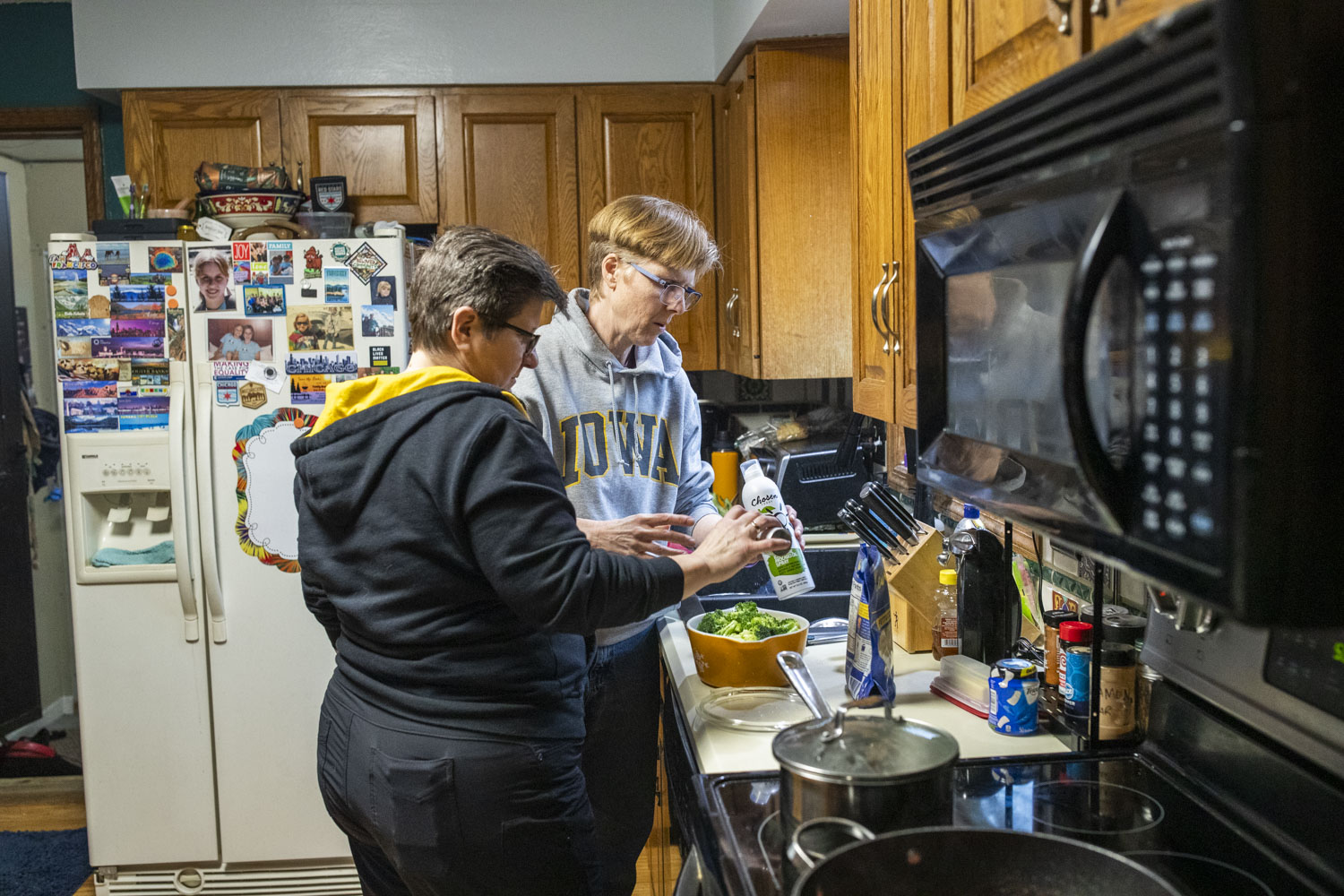When Jen and Dawn BarbouRoske first met on a softball team in Grinnell, Iowa, the two said it was the sentimental kind of love that is only seen in romantic comedies.
“It was one of those sorts of goofy love at first sight, it really was for both of us,” Dawn BarbouRoske said. “We would just hang out, looking at the stars, and I mean, it was pretty sappy.”
As the years went by and their love for each other grew, the BarbouRoskes eventually got married — not once, but twice.
Their first wedding was just between the two of them in October 1990, and they exchanged rings without any big ceremony or family and friends. This first wedding was not legally recognized because of one reason: The BarbouRoskes are a lesbian couple.
After moving across the country for Dawn BarbouRoske’s job, the BarbouRoskes eventually settled back down in Iowa — specifically in Iowa City — to begin to raise their first child around 2001. Soon after, the couple found themselves as plaintiffs in Varnum v. Brien, the Iowa Supreme Court case that legally recognized same-sex marriage in the state.

As their family grew, the BarbouRoskes said there were many legal hoops they had to jump through at each new milestone. For example, when Jen BarbouRoske gave birth to her first child, the BarbouRoskes had to sign multiple papers and meet with a counselor to jointly adopt their child.
Despite many bureaucratic setbacks, though, the BarbouRoskes built a strong, accepting community around their family. The couple formed the Proud Families group shortly after moving to Iowa City, which consisted of local members of the LGBTQ+ community and their children.
On April 3, 2009, same-sex marriage became legal in Iowa because of Varnum v. Brien. The BarbouRoskes said at the time they were flabbergasted by the decision because they never thought marriage would ever be an option for a couple like them.
“We always hoped to be in a committed, long-term relationship with somebody, but the concept of marriage was beyond what we were thinking,” Jen BarbouRoske said.
Attitudes toward same-sex marriage in Iowa at the time were positive despite the state’s conservative reputation. Mitchell Gold, the retired founder of the home furnishing company Mitchell Gold + Bob Williams, said he got married in Iowa in June 2010 despite not being from or living in Iowa.
Gold said he and his partner at the time, Tim Scofield, chose to get married in Iowa partly because of its central location to their family members, but mostly they felt recognizing the state of Iowa for its progressive values would be a powerful statement.
“I thought it would have a great impact if it was written about locally that we got married in the middle of America — Iowa — not a liberal place but a rather conservative [place],” Gold said.
Gold said he was never on the receiving end of any homophobic comments in Iowa or North Carolina, which is where he lives.
“I can’t think of anybody that said something nasty and snarky to me, which is just some level of progress,” Gold said.
In recent years, however, the BarbouRoskes and Gold said attitudes around same-sex marriage have shifted.
“I think it’s not easy to say ‘Oh, everything is better,’ and on the contrary side, it’s not easy to say, ‘Oh, everything’s falling apart,’” Gold said. “It’s this continued struggle, but I do think the struggle now is a little more severe than it was five years ago.”
Recent marriage equality bills
Last year, a bill was drafted in the Iowa Legislature that would define marriage in the state’s constitution as “the solemnized union between one human biological male and one human biological female.” The bill was sponsored by eight Republican representatives in the state House.
Bills of this nature have been introduced in the Iowa Legislature year after year, Rep. Brad Sherman, R-Williamsburg, said.
For example, a bill was introduced in the Iowa House that would amend the Iowa code to state that the Iowa Supreme Court does not have jurisdiction over the laws determining the validity of marriage in the state. This bill was introduced during the 84th general assembly, between 2011 and 2013.
Sherman, who drafted the bill, said the bill is not trying to take away the right to marriage for same-sex couples but rather preserve Christian values in the state.
“I’m not trying to violate somebody’s rights or push them down,” Sherman said. “But what I do believe is that to define marriage in this way violates very sacred religious principles.”
Sherman said although the current state code already defines a “valid” marriage as being between a man and a woman, this bill is necessary because state courts have to abide by Iowa’s constitution.
“The courts basically have ignored state code, and they’ve gone ahead and basically legitimized same-sex marriage — the [Iowa] Supreme Court did that in 2009,” Sherman said. “So I think it’s probably just one of those things in the code that has been overlooked.”
Around the same time this bill moved through the Iowa Legislature, another bill was drafted that would make the state code less gendered when referring to marriage. This bill was sponsored by 30 Democrats in the state House.
Rep. Elinor Levin, D-Iowa City, drafted the bill and said the time has come for the state to bring its code to modern times.
“Iowans want to let others go about their business and live their lives. Iowans want to see their friends and family happy and safe and secure,” Levin said. “And these bills that try to tear families apart, that try to take adoptive children out of loving homes, are never going to be the way to do that.”
Neither of these bills were assigned to a subcommittee, but both Levin and Sherman said these kinds of bills will certainly be seen in the Iowa Legislature in the future.
Bills such as these in Iowa have also popped up in legislatures across the U.S. For example, a Tennessee bill that allows public officials to refuse to carry out a marriage if it goes against their beliefs was signed into law in February.
Sarah Kate Ellis, the CEO and president of the LGBTQ+ advocacy group GLAAD, wrote in a statement to The Daily Iowan the fight for marriage equality in Iowa was one step in making the nation more accepting of same-sex marriage.
“Our relationships, children, and families are more accepted now than ever,” Ellis wrote. “The fight for marriage equality had an immeasurable impact on expanding empathy and acceptance in the heartland and beyond.”
According to a 2023 poll from Gallup, 71 percent of those surveyed said they believe same-sex marriages should be recognized by the law as valid with the same rights as opposite-sex marriages.
Marriage equality’s history
The first few states to legally recognize same-sex marriage did so through court rulings rather than putting marriage equality into the law through legislation, according to Reuters.
The first U.S. state to do so was Massachusetts in 2003. Five years later, Connecticut became the second state to recognize same-sex marriage in its courts, followed by Iowa in 2009.
That same year, Vermont became the first U.S. state to recognize same-sex marriage through legislation. This was soon followed by New Hampshire and Washington, D.C., also in 2009.
Eventually, more and more states began to recognize same-sex marriages through legislation or court cases. By February 2015, only 13 states banned same-sex marriage, according to CNN.
On June 26, 2015, the U.S. Supreme Court ruled in a 5-4 vote that same-sex marriage is a right guaranteed by the Constitution in the case of Obergefell v. Hodges. This decision legalized same-sex marriage for all states.
In December 2022, President Joe Biden signed the “Respect for Marriage Act” into law. This act created legal authority for same-sex and interracial marriages and repealed any laws that prevented a same-sex marriage in one state from being recognized in another.
Marriage equality’s future
Despite the progress and cultural shifts surrounding marriage equality, some members of the LGBTQ+ community worry this right could be taken away in the future.
Grace Nelson, a first-year student at the University of Iowa, is from Sioux City, Iowa. She said while she considers Iowa home, she would leave the state if her rights as a member of the LGBTQ+ community were taken away.
“If it comes down to it where I’m not going to be legally recognized as married to another woman if that law were to be passed, then I would leave,” Nelson said. “I would completely move out of the state and live somewhere where I am recognized as legally married to another woman or whatever the case may be.”
Nelson said Iowa’s recent legislation surrounding transgender issues, such as “bathroom bills” and bills that would require school officials to out transgender students to their parents, are more concerning to her than marriage equality at this point in time.
These bills can have a detrimental effect on the mental health of the transgender community, especially transgender youth, Nelson said.
“I don’t think what [the state legislature is] trying to do is going to have any positive impact whatsoever,” Nelson said. “So it just causes me a lot of fear.”
According to a 2023 national survey from The Trevor Project, 41 percent of youth in the LGBTQ+ community seriously considered attempting suicide in the past year.
Kylen Phllips, a UI second-year student, shared the same sentiments as Nelson. The Davenport native said he has considered leaving the state because of recent legislation involving the transgender and LGBTQ+ community, but he does not plan to leave forever.
“I’ve always had plans to leave the state to gain some sort of more power to come back and help this state,” Phillips said. “Because I see that there are a lot of glimmers of hope a lot of the time, and there’s a lot of people who do care about the community in Iowa, it’s just not enough right now.”
The BarbouRoskes said recent legislation targeting the transgender community has made them fearful as well as disappointed.
“I think often of moving,” Dawn BarbouRoske said. “We fought so long to earn the rights not only for marriage but for LGBTQ+ youth, and we don’t want to give that up at the same time.”
The BarbouRoskes both work for the Iowa City Community School District and said seeing the children they work with has given them hope for the future.
“We work with youth, and I have great hope that things will get better because the kids seem to understand,” Jen BarbouRoske said. “They respect each other and respect each other’s pronouns.”






